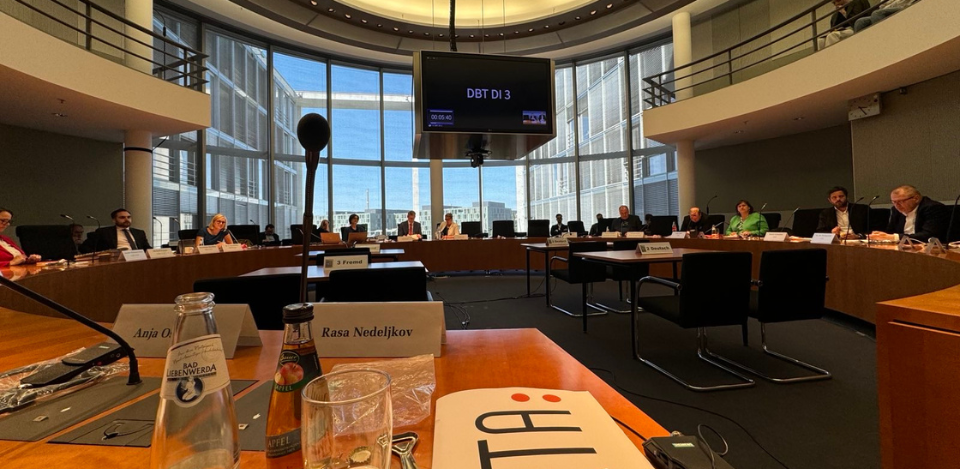CRTA’s address at the session of the Bundestag Committee for Cultural and Media Affairs
 Photo – CRTA
Photo – CRTA
Read the full speech of Rasa Nedeljkov, Crta’s Program Director and Chief of the Crta’s Election Observation Mission at the session the Bundestag Committee for Cultural and Media Affairs held on May 15th 2024.
Chairwoman, Honorable Members, Ladies and Gentleman.
Many countries are facing a challenging situation in which their governments are not capable enough to combat disinformation campaigns. But in Serbia, there’s a much more complex problem – the Government itself uses disinformation narratives as a dominant tool of governance. These narratives are primarily disseminated through government-friendly mainstream media outlets.
Serbia’s media laws and regulatory framework are a facade, hiding the government’s grip on media freedom. The media regulatory authority routinely neglects its core function of overseeing the media under its jurisdiction and citizen outcries for accountability.
This context requires urgent, decisive, and innovative actions – such as, demonetization of information manipulation. A recent example is Lidl’s decision to pull their advertisement from Serbian media that spread explicit propaganda, severing the financial lifeline of such outlets. This move highlights the efficacy of public advocacy in reshaping corporate power toward social responsibility.
I want to take this opportunity to thank the Bundestag members who publicly backed this fight against disinformation in Serbia and assisted in our endeavor to demonetize it and delegitimize it.
Despite these small steps, large challenges remain. Narratives that vilify the West, Serbia’s neighbors, and government opponents while nurturing a personality cult instead of democratic institutions are prevalent within Serbia’s political discourse. Western institutions have recently been featured as the “collective West” aiming to collectively punish Serbian people over the Srebrenica genocide or as antagonistic forces seeking to undermine Serbian sovereignty. Simultaneously, Russian leadership and policies are glorified.
Most often – Kosovo, Srebrenica, and controversies over the commemoration of victims and war crimes around the region serve to fuel fear and revive nationalism. Serbian political leaders and mainstream media exploit grievances and past conflicts to invent external and internal enemies. Newspaper front pages have featured over 100 warnings for war within a six-month timeframe, speculating the risk of escalating tensions in the Balkans.
A shift towards an extremely right-wing agenda has infiltrated the political discourse. Right-wing parties are frequent coalition partners of the ruling party. Their leaders come with extremist views or war crime backgrounds and are frequent interlocutors on national TV channels. Most prominently, Vojislav Šešelj, convicted war criminal and leader of the Serbian Radical Party, has appeared on nationally covered TV channels 22 times in 2024 alone.
The Government’s media influence drives peoples’ perceptions. For example, in 2000, just after the NATO bombing, 14% of citizens saw membership in the alliance as a viable option. By 2022, this support plummeted to just 1%. CRTA public opinion research also shows that citizens tend to perceive Russia as Serbia’s main political and security partner; moreover, citizens are inclined to prioritize maintaining strong ties with Russia over furthering European integration efforts.
It is, in fact, the Serbian Government that uses the Kremlin propaganda playbook. Some of the main coordinated efforts between the Russian and the Serbian Government are on “color revolution” or “Maidan”, “foreign agents,” or anti-West narratives. Russian Government representatives frequently appear on Serbian mainstream media to endorse positions and views of the Serbian Government.
In addition to Russia, the Serbian Government has been promoting and deepening partnerships with China with new worrying developments. Main pro-government media houses signed agreements with Chinese state-owned companies on the occasion of President Xi’s visit on May 8.
To conclude, disdain for liberal democracy goes hand in hand with Serbian nationalism, which is at the core of ongoing media manipulations. It erodes social and democratic fabric and institutional integrity… puts strong authoritarian leadership above separation of powers… collective above individual… one voice above pluralism… and the myth of a Serbian Kosovo above a European future. We need a European future and seek your help in combating the toxic ideology that is being weaponized for geo-political gain, rather than serving the genuine interests of the citizens of Serbia.








